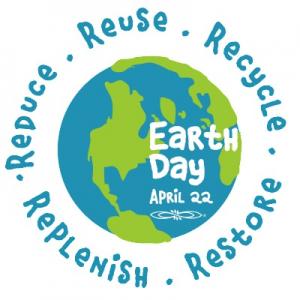![]()
TRINIDAD: April 25, 2016: The Government of the Republic of Trinidad and Tobago joined the global community in commemorating Earth Day on April 22nd, 2016.

Earth Day is celebrated on April 22nd annually, marking the anniversary of the birth of the modern environmental movement in the 1970s. The movement gave a voice to emerging environmental consciousness, and channelled human energy towards bringing prevailing environmental issues such as pollution, use of pesticides and biodiversity loss to the forefront.
Earth Day mobilises millions of people around the world to take action to support environmental protection. It has become the largest observance in the world, celebrated in an effort to encourage changes in human behaviour and provoke policy reforms. The theme for Earth Day 2016 is “Trees for the Earth!” With over 15 billion trees lost each year from deforestation, land development and poor forest management, Earth Day 2016 focuses on encouraging persons worldwide to plant trees.
Trees, and forests in general, are important because they help fight climate change and air pollution by providing climate regulation and sequestering (capturing) carbon dioxide emissions which are a major greenhouse gas. They also provide habitats for wildlife and provide essential ecosystem services such as flood control, watershed protection, and food and water provision, soil erosion protection to name a few essential for human survival. Additionally, trees support communities, their local economies and livelihoods.
The theme of Earth Day 2016 placed emphasis on regions of the world most affected by deforestation. This is particularly pertinent to Trinidad and Tobago considering that country is well-endowed with rich forest ecosystems covering approximately over 250,000 hectares of our land area. These consist of various types such as evergreen seasonal forest, semi-evergreen seasonal forest, deciduous seasonal forest, dry evergreen forest, montane forest, mangrove forest, herbaceous swamp, palm marsh and marsh forest.
Our forests provide habitats for a great variety of animal and plant species that enables our country to have one of the highest levels of biodiversity of all the Caribbean islands. Furthermore, this country’s forest resources are of paramount importance to all sectors of society. Nowhere is this more relevant, than in our rural communities where hunting, logging, craft, tour guiding and other nature-based recreational activities contribute significantly to local economies.
However, there are several causes of forest loss and degradation in Trinidad and Tobago such as forest fires, infrastructural development, unsustainable land use and illegal logging as well as overharvesting of forest products. In light of the importance of trees and forests towards the protection of the environment and to sustainable development, the Government of Trinidad and Tobago has pursued various policy and legislative measures as well as activities to ensure the conservation and protection of our forests.
Trinidad and Tobago has one of the earliest records of formal protection of forests with the establishment of the first Forest Reserve in the Western Hemisphere in Tobago’s Main Ridge in 1765. Under the Forests Act (Chap. 66:01 of 1915) a number of prohibited areas in Trinidad and Tobago are designated which restricts entry for set periods of time of the year (e.g. at certain nesting beaches during sea turtle nesting season from 01 March to 31 August), or throughout the year (e.g. Aripo Savannas) to ensure the protection of the nation’s forested areas that represent significant examples of the country’s natural heritage and for future generations. Some prohibited areas include areas that were also declared as Forest Reserves and Wildlife Sanctuaries.
Environmentally Sensitive Areas (ESAs) have been designated under the Environmental Management Act (Chap. 35:05) Environmentally Sensitive Areas Rules, for the conservation and management of biologically significant areas including forested areas. There are currently three (3) ESAs which include the Aripo Savannas Strict Nature Reserve, Nariva Swamp Managed Resource Protected Area and the Matura National Park. They are intended to serve several objectives relating to biodiversity, species, ecosystem and livelihoods conservation, fulfilling international obligations and the promotion of scientific research.
The three (3) recently approved National Forest, Protected Areas and Wildlife Policies also provide the policy context for the sustainable management and conservation of, among others, our forest ecosystems and wildlife. These policies offer guidance for the development of legislation that will enable Trinidad and Tobago to establish an appropriate administrative and institutional framework for the management of forests and wildlife and designation of protected areas. As such, the Ministry of Planning and Development is in the process of drafting and finalising enabling legislation; i.e. the Forest, Protected Areas and Wildlife Conservation Bill and its regulations necessary for the implementation of the National Forest, Protected Areas and Wildlife Policies.
Additionally, the Ministry, in collaboration with the Food and Agriculture Organisation of the United Nations (FAO), has initiated the implementation of the “Improving Forest and Protected Area Management in Trinidad and Tobago” Project. This four (4) year project supports the Government’s policy reforms for biodiversity conservation for sustainable management of forestry and protected areas. It will establish six pilot protected areas to model participatory approaches as well as enhance capacity and finance for sustainable natural resource management.
The Government is committed to the protection of the environment through the preservation and proper management of our nation’s forest ecosystems and thus, supports the cause of Earth Day 2016. In addition to the efforts of the Government, every citizen of Trinidad and Tobago must understand the value of our trees and forest resources in providing the ecological and socio-economic needs and enhancing the well-being of the current and future generations. Let us all do our part and join the world in planting a tree for Earth Day 2016!

Ministry of Planning and Development commemorates World Earth Day
Must Read
Agriculture Sector Webinar Series for 2025 hurricane season
CARICOM Secretariat hosts Webinar series aims to prepare agriculture sector for 2025 hurricane season
With the hurricane season approaching (June - November), the CARICOM Secretariat...




